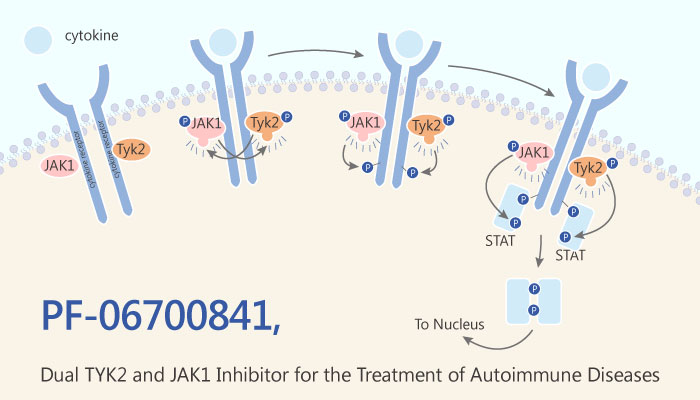Autoimmune diseases are condition arising from an abnormal immune response to a normal body part. Autoimmune diseases are generally characterized by a dysregulation of cytokine signaling. Cytokine signaling is an important characteristic of autoimmune diseases. Especially, cytokines play pivotal roles in the maintenance of an appropriate immune response. Gratifyingly, targeting cytokine receptors has been an effective means of treating immune-related disorders.
Many pro-inflammatory cytokines signal through the JAK/STAT pathway. Signal transduction pathways involving JAK1, JAK2, STAT3 and STAT5 involves in driving both the malignant cells and the inflammatory process. JAK is an ideal target for the treatment of autoimmune diseases.
The JAK kinases are intracellular protein tyrosine kinases comprise of four members: JAK1, JAK2, JAK3, and TYK2. Of these, JAK1 is important for the γ-common chain cytokines, interleukin (IL-6), and type-I interferon (IFN) family. Intervention with monoclonal antibodies (mAbs) or JAK1 inhibitors has demonstrated efficacy in psoriasis, psoriatic arthritis, inflammatory bowel disease, and rheumatoid arthritis studies. Moreover, TYK2 is an member of the JAK family for molecules complementing human cell lines mutant for interferon responses. TYK2 appears as an attractive target for therapeutic intervention. TYK2 in addition to type-I IFN signaling also plays a role in IL-23 and IL-12 signaling. Besides, the JAK2 is a critical regulator of inflammatory processes. As a result, JAK inhibitors would be the future of autoimmune disease treatment.
In this study, Fensome A, et al hypothesized that a JAK Inhibitor PF-06700841, which provides potential efficacy. PF-06700841 inhibits JAK1, JAK2, JAK3, and TYK2 with IC50s of 17, 77, 6494, and 23 nM, respectively.

Reference
Fensome A, et al. J Med Chem. 2018 Oct 11;61(19):8597-8612.